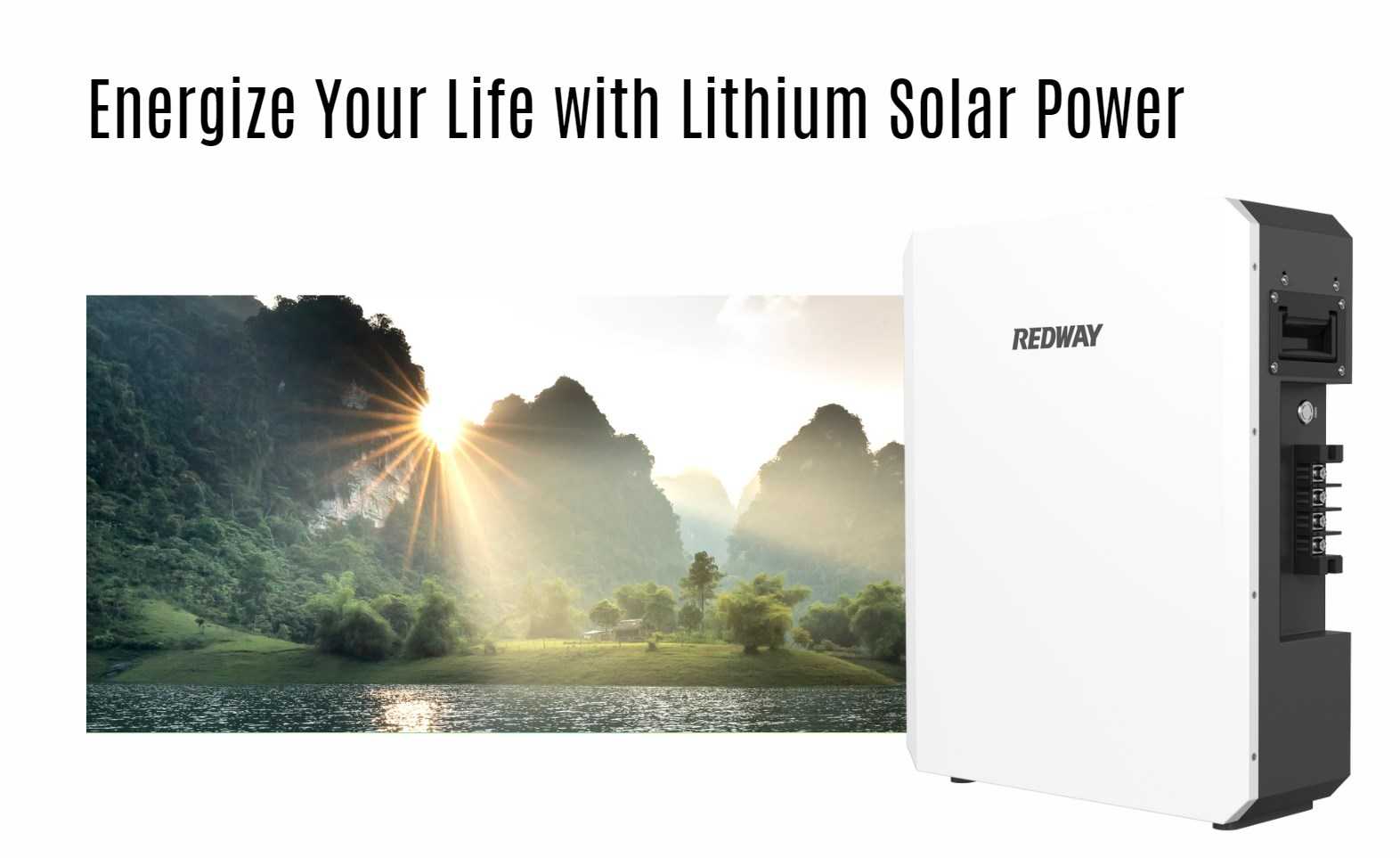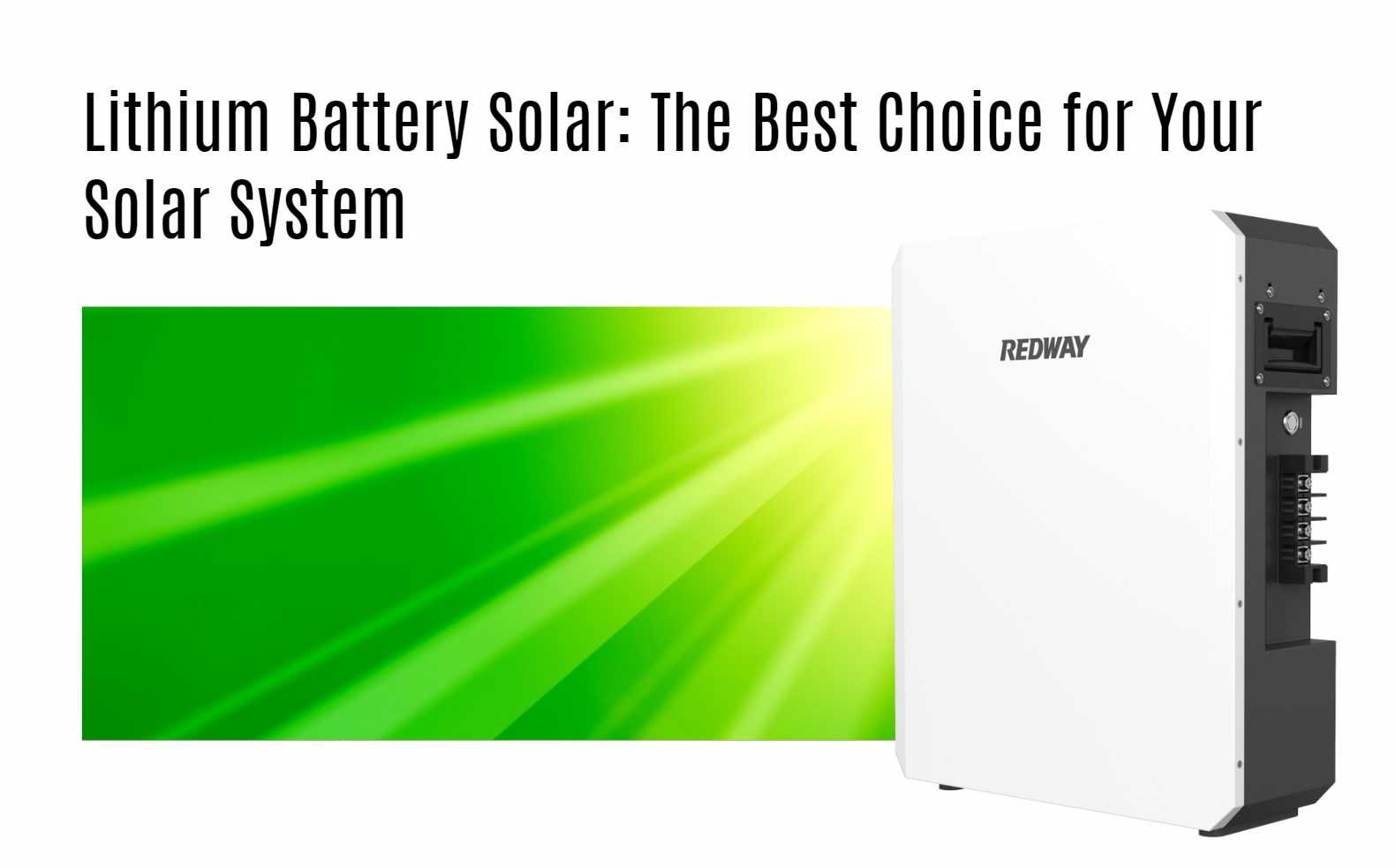-
High Energy Density: Lithium batteries store more energy per unit of weight or volume, ensuring efficient energy storage for your solar system. This allows you to make the most of the available space and weight capacity, maximizing the overall energy storage capacity of your system.
-
Long Cycle Life: Lithium batteries have a longer cycle life compared to traditional lead-acid batteries. This means they can be charged and discharged many more times without losing their capacity to hold a charge. With a longer lifespan, lithium batteries offer durability and reliability for long-term energy storage.
-
Faster Charging: Lithium batteries enable faster charging, which is particularly beneficial in solar energy systems. They can efficiently charge during peak sun hours, ensuring that the battery is fully charged before sunset. This maximizes the amount of energy that can be stored and used during periods of low sunlight or at night.
Say Goodbye to Hassle, Hello to Efficiency
One of the biggest advantages of lithium battery solar is its efficiency. Unlike lead-acid batteries, which have a limited depth of discharge (DOD), lithium batteries can be discharged to a much greater extent without damaging the battery. This means you can use more of the energy stored in your battery and get more out of your solar system.
Lithium batteries are also much lighter and more compact than lead-acid batteries, making them easier to install and maintain. They require less space and can be mounted in any orientation, even upside down. Plus, they have a longer lifespan than lead-acid batteries, so you won’t have to replace them as often.
How Solar Installation Increases Home Value?
- Increased Home Value: Solar installation can increase the value of a home by providing clean energy, reducing electricity costs, and aligning with the growing demand for renewable energy. Studies have shown that homes equipped with solar panels can see an average increase in value of around 4%.
- Financial Benefits: Solar panels offer long-term energy savings, reducing electricity bills and providing potential tax credits. By investing in solar panels, homeowners can enjoy financial advantages and a more sustainable lifestyle.
- Factors Influencing Value Increase: Location, solar incentives, and the condition of the solar system can influence the extent of the value increase. Areas with higher electricity costs and strong solar markets may see a larger impact on home value.
- Considerations for Buyers: When purchasing a home with solar panels, it is important to assess the age and condition of the solar system. Owned solar panels generally add more value than leased panels, as potential buyers may hesitate to assume lease agreements.
What is Grid-Tied Solar System with Battery Backup?
- Reliable Power Supply: A grid-tied solar system with battery backup ensures continuous power supply, even during outages or periods of low sunlight. The battery backup system kicks in to provide power to essential loads, increasing household resilience and avoiding disruptions caused by power outages.
- Energy Autonomy: By utilizing solar energy first, reducing reliance on the grid, and storing surplus solar power in batteries, homeowners can achieve energy autonomy. This means they can rely less on grid power and have greater control over their energy usage and costs.
- Lower Electricity Bills: A grid-tied solar system with battery backup allows homeowners to reduce their electricity bills by utilizing solar energy and storing excess power for later use. This reduces the amount of energy purchased from the grid and can result in significant cost savings over time.
- Environmental Benefits: By maximizing the use of renewable energy, a grid-tied solar system with battery backup contributes to reduced fossil fuel consumption and lower carbon emissions. It promotes a more sustainable and eco-friendly energy future.
- Increased Household Resilience: The battery backup system in a grid-tied solar system ensures that essential loads in the home continue to receive power during outages. This increases household resilience and minimizes the impact of power disruptions on daily life.
How Does Grid-Tied Solar System Operate?
- How does a grid-tied solar system work?
- A grid-tied solar system seamlessly connects to the utility grid, allowing you to send excess electricity back to the grid and draw power from it when needed. This is made possible through net metering, where you receive credits for the excess electricity you produce.
- The components of a grid-tied solar system
- Solar panels: These panels absorb sunlight and convert it into electricity.
- Inverters: They convert the DC electricity from the panels into AC electricity for use in your home.
- Distribution panel: This panel allocates the solar-generated electricity to power your home or business.
- Electric meter: It tracks the flow of electricity to and from the grid, ensuring accurate billing and credits.
- Benefits of a grid-tied solar system
- Cost-effective: By generating your own electricity, you can significantly reduce or eliminate your electricity bills.
- Environmental impact: Solar energy is clean and renewable, reducing your carbon footprint and contributing to a sustainable future.
- Net metering: You can earn credits for the excess electricity you produce, offsetting your energy consumption from the grid.
- Reliable power supply: With access to the utility grid, you have a backup power source during times of low solar production or grid outages.
What are Different Types of Solar Systems Available?
- Grid-Tied Solar Systems:
- These systems are connected to the utility grid, allowing for the exchange of excess electricity.
- Advantages: Cost-effective, offset electricity bills, no need for battery storage.
- Applications: Residential and commercial buildings in areas with reliable grid access.
- Off-Grid Solar Systems:
- Designed for remote locations without access to the utility grid.
- Advantages: Self-sufficiency, independence from the grid, reliable power in remote areas.
- Applications: Remote homes, cottages, weather stations, off-grid installations.
- Hybrid Solar Systems:
- Combines grid-tied and off-grid features, offering backup power and reducing reliance on the grid.
- Advantages: Backup power during outages, energy independence, flexibility.
- Applications: Homes and businesses seeking backup power, areas with unreliable grid access.
How Does Solar Power Work?
- Conversion of sunlight into electricity:
- Solar power is generated through photovoltaic (PV) panels that contain solar cells made of silicon.
- These solar cells absorb photons from sunlight, releasing electrons and creating an electric current.
- This direct current (DC) electricity is the initial form of solar power generated.
- Transformation from DC to AC:
- To make solar power compatible with homes and businesses, the DC electricity is converted into alternating current (AC) using an inverter.
- The inverter ensures that the electricity produced by solar panels can be used to power appliances and devices.
- Advantages of solar power:
- Renewable and clean energy source: Solar power relies on the sun, which is an abundant and renewable resource, and it produces no harmful greenhouse gas emissions.
- Cost savings: By generating your own electricity, you can reduce or eliminate your reliance on the grid, resulting in potential cost savings on electricity bills.
- Environmental impact: Solar power helps to reduce carbon emissions and dependence on fossil fuels, contributing to a cleaner and more sustainable environment.
- Energy independence: With solar power, you can have greater control over your energy production and reduce your reliance on external energy sources.
Lithium Battery Solar: Cost-Effective & Long-Lasting
-
Superior Cost-Effectiveness: Despite the higher upfront cost, lithium battery solar offers long-term cost-effectiveness. With their extended lifespan, minimal maintenance requirements, and efficiency, lithium batteries outperform other types. They provide a reliable and economical solution for storing solar energy, ensuring optimal utilization and savings in the long run.
-
Long-Lasting Performance: Lithium batteries have a longer lifespan compared to traditional lead-acid, nicd, nimh, and sodium-sulfur batteries. They require minimal maintenance and offer consistent performance over time. With their high energy density and compact size, lithium batteries provide reliable and long-lasting energy storage for your solar system.
-
Factors Affecting Cost: The cost of lithium solar batteries depends on various factors, including the manufacturer, storage capacity, number of batteries, features, and installation. Top choices in the market include the Tesla Powerwall 2, Enphase IQ 10, Generac PWRcell, LG RESU, and BYD Battery-Box Premium HV. Evaluating these factors will help you make an informed decision and choose the best lithium battery solar solution for your energy needs.
Plus, lithium batteries are more efficient at charging and discharging, which means you’ll get more energy out of your solar panels.36V30Ah.
Energize Your Life with Lithium Solar Power
-
Increased Efficiency: Lithium solar batteries are more efficient than lead-acid batteries, allowing for the storage of more energy and longer periods of power without frequent recharging. This makes them ideal for powering large systems or providing backup power during extended outages.
-
Reduced Maintenance: Compared to lead-acid batteries, lithium batteries require less maintenance, saving you time and money over the life of your system. With no need to regularly check water levels or worry about corrosion or leaks, you can enjoy hassle-free energy storage.
-
Reliable and Sustainable: Lithium batteries have a longer lifespan and are more environmentally friendly, being non-toxic and 100% recyclable. They provide a reliable energy storage solution, protecting against extreme weather events and extending the life of your solar power system.

FAQs
How Does Net Metering Reduce Electric Bill?
- Understanding Net Metering: Net metering is a billing mechanism that allows customers with solar panels or renewable energy systems to send excess electricity back to the grid and receive credits for it. This credited energy can be used when the solar panels are not producing enough electricity, resulting in reduced reliance on the grid and lower electric bills.
- Financial Savings: Net metering enables homeowners and businesses to offset their electricity costs by utilizing the excess energy generated by their renewable energy systems. By effectively reducing their reliance on the grid, customers can experience significant savings on their electric bills.
- Benefits for the Grid and the Environment: Net metering promotes the adoption of renewable energy sources, such as solar power, which reduces the demand for traditional fossil fuel-based electricity generation. This helps to lower greenhouse gas emissions and minimize strain on the energy grid, leading to a more sustainable and reliable energy infrastructure.




